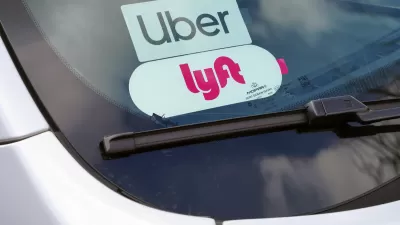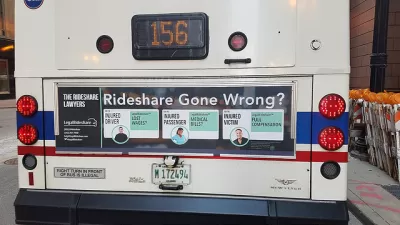Some credit a drop in DUI arrests in the city of Chicago to drunks using ride hailing services.

DUI arrests have fallen since the arrival of ride hailing apps in Chicago in 2011, according to a study by the Moll Law Group. "The report compared the average number of DUI arrests two years before Uber launched in these cities to the average number during subsequent years and found that the number decreased in all of the cities," John Greenfield reports in Streetsblog Chicago.
"In the two years before Uber debuted here in September 2011, the average number of arrests per year was 4,018, according to Chicago Police Department data," Greenfield reports. In 2016 that number was 3,284. The decrease is consistent with falling rates in other American cities after ride hailing.
Still, while the arrival of ride hailing in the city may be correlated with fewer DUI arrests, the study does not necessarily prove that ride hailing is causing a decrease in drunk driving. Greenfield points out that DUI arrests in the city were already trending down before 2011, and arrests may be related to a number of factors beyond the prevalence of drunk driving.
FULL STORY: Did the Rise of Ride-Hailing Contribute to a Decrease in Chicago DUI arrests?

Maui's Vacation Rental Debate Turns Ugly
Verbal attacks, misinformation campaigns and fistfights plague a high-stakes debate to convert thousands of vacation rentals into long-term housing.

Planetizen Federal Action Tracker
A weekly monitor of how Trump’s orders and actions are impacting planners and planning in America.

In Urban Planning, AI Prompting Could be the New Design Thinking
Creativity has long been key to great urban design. What if we see AI as our new creative partner?

King County Supportive Housing Program Offers Hope for Unhoused Residents
The county is taking a ‘Housing First’ approach that prioritizes getting people into housing, then offering wraparound supportive services.

Researchers Use AI to Get Clearer Picture of US Housing
Analysts are using artificial intelligence to supercharge their research by allowing them to comb through data faster. Though these AI tools can be error prone, they save time and housing researchers are optimistic about the future.

Making Shared Micromobility More Inclusive
Cities and shared mobility system operators can do more to include people with disabilities in planning and operations, per a new report.
Urban Design for Planners 1: Software Tools
This six-course series explores essential urban design concepts using open source software and equips planners with the tools they need to participate fully in the urban design process.
Planning for Universal Design
Learn the tools for implementing Universal Design in planning regulations.
planning NEXT
Appalachian Highlands Housing Partners
Mpact (founded as Rail~Volution)
City of Camden Redevelopment Agency
City of Astoria
City of Portland
City of Laramie




























